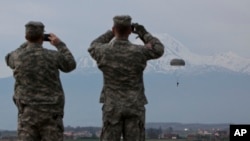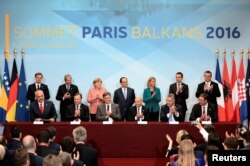The Washington-based Atlantic Council is calling for a permanent American military presence in the Balkans to stabilize southeastern Europe amid increased Russian efforts to exert political influence across the region.
In a report published Tuesday, the nonprofit international affairs group said that announcing the arrival of U.S. troops, ideally at Camp Bondsteel in Kosovo, "would demonstrate an enduring U.S. commitment to security in the region and anchor the United States’ long-term ability to influence developments."
"When it comes to security, it should be clearly stated that U.S. influence and power will be a long-term, stabilizing force in the region," Damon Wilson, Atlantic Council executive vice president and one of the report's authors, told VOA's Serbian service.
"And it has nothing to do with the forces in Kosovo," he said. "Our presence in northeast Europe has served as a stabilizing force for our allies, so the military structures and the constant presence in southeastern Europe should ... provide a real sense of security for political leaders to make difficult decisions and to undertake necessary risks."
The Atlantic Council, which functions independently of the U.S. government, will host Balkan officials for a November 29 conference to discuss policy proposals aimed keeping the region "firmly embedded within the trans-Atlantic community."
Some proposals unveiled in the new report align with prior calls by U.S. policy hawks, such as Senator John McCain, an Arizona Republican, who in April called for a substantially strengthened U.S. commitment to the region.
In an op-ed titled "The Balkans are heating up again — and Washington is nowhere to be seen," McCain called an October 2016 Russian-backed coup attempt in Montenegro, which the Kremlin has vigorously denied involvement in, the most dramatic example of a broader campaign to destabilize Western-leaning democracies in the region.
In June, a Montenegrin court confirmed prosecution indictments against 14 people, including two Russians, for masterminding the coup attempt, which was aimed at preventing Montenegro from joining NATO. The other 12 suspects, mostly Serbs, allegedly planned to take over parliament in the capital, Podgorica, and kill then-Prime Minister Milo Djukanovic.
Also citing political instability in Bosnia and Macedonia, insufficient youth employment and widespread corruption, McCain described the broader Balkans region as ripe for exploitation by terror organizations seeking a foothold on European soil.
“Some age-old, some new tensions in the region require our attention, and my concern is that as our attention has been diverted to Ukraine, the Middle East, to China ... it’s very clear the Russians are trying to extend their malign influence in the [Balkans] region,” McCain told VOA in April. “The attempt at a coup in Montenegro is a graphic example of that.”
According to Wilson, Atlantic Council experts are advocating a more proactive U.S. role on the ground in order to "be ahead of the events, to determine our interests and to promote the U.S. strategy," instead of reacting to Russian activity in the region.
Improved US-Serbian ties
Tuesday's report also called for improved economic prospects for the region's predominantly Muslim youth — specifically via large-scale infrastructure projects designed to interlink Balkan nations and improve access to the European mainland — and a historic U.S.-Serbian rapprochement.
"Belgrade can and should be a close partner and ally in the region, but it can only become one if it begins to meaningfully distance itself from Russia," the Atlantic Council report said. "This is not a trivial pivot for Serbian leadership, but neither should it be something on which the United States or the EU should compromise."
Last month, Serbian Defense Minister Aleksandar Vulin criticized remarks by Hoyt Brian Yee, the top U.S. diplomat in the region, who had called on Belgrade to choose between aligning itself with either Washington and Brussels or Moscow.
The "statement was not made by a friend or a person respecting Serbia, respecting our right to decide independently," Vulin said.
Yee later expressed appreciation for the historical, cultural and religious links between Belgrade and Moscow, but said Serbia's leadership needed to "make very clear what its policies are.”
"There is a great chance for Serbia, under [President Aleksandar] Vucic's leadership, and the United States under this administration, to try to bring about a historic reconciliation between the two countries that recognizes that there are many more areas in which we can cooperate," Wilson told VOA. "And, as is evident in surveys and other sources, the electorate in Serbia understands that the future is in Europe."
In June, the State Department expressed concern about a disaster relief center Russia is operating in Serbia, which some Western groups and military analysts see as a subtly disguised military base set up by the Kremlin to spy on U.S. interests in the Balkans.
The upcoming Balkans conference will be followed by meetings between high-level Balkan and U.S. officials in the State Department and White House.
Milena Djurdjic of VOA's Serbian service contributed to this report.







